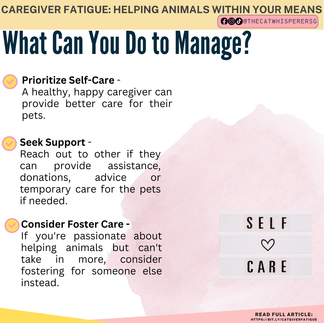Helping Animals Within Your Means
- The Cat Whisperer Singapore

- Jun 4, 2024
- 3 min read

Taking in rescue pets is a noble and selfless act, however, it's essential to recognize your limits to ensure the well-being of both the animals and yourself.
Knowing when you've reached your limit in taking in rescue pets is essential for maintaining a healthy balance between your responsibilities & well-being. By recognizing the signs of burnout & assessing your resources, you can make informed decisions that ensure the best outcomes for both you & the animals in your care.
I once had a rescuer tell me that she does not eat out because to her, the $30-$50 she spends on herself, can be spent on 1 day hospitalization care for a cat.
Many rescuers or fosterers may face caregiver fatigue, so it is important to address that you are helping animals within your means.
Signs You've Reached Your Limit:
1. Physical and Mental Exhaustion:
You feel constantly tired, overwhelmed, or burnt out, or not able to get enough rest. This can impact your ability to care for the pets effectively.
2. Neglecting Personal Needs:
Your own health, hygiene, happiness or well-being is being compromised. You may find yourself skipping meals, not exercising, ignoring appointments or friends, or neglecting your own appearance.
3. Financial Strain:
The cost of caring for multiple rescue pets is exceeding your budget, leading to financial stress.
This includes expenses for food, veterinary care, supplies & other necessities.
Your living space is becoming overcrowded & unkempt, which can lead to stress for both you & the pets. Each pet should have enough a clean environment to move around comfortably, and so should you.
5. Decreased Quality of Care:
You struggle to provide the necessary attention, care & socialization for each pet. This can lead to neglect or inadequate care for some animals. Behavioral problems among your pets may escalate but you find it challenging to address them effectively. This can create a stressful and chaotic environment.
6. Emotional Stress:
You feel increasingly anxious, irritable, frustrated & in a constant worried state. The emotional burden of caring for multiple pets can affect your mental health & relationships with others.
7. Lack of Time:
You find yourself running out of time to adequately care for each pet, manage household chores, work responsibilities & maintain social relationships.
How to Manage:
1. Recognize Your Limits:
It's okay to acknowledge that you can't save every animal. Accepting your limits is a crucial step in ensuring the well-being of both the animals you care for & yourself. Do not be ashamed or feel guilty to turn away cases. Help within your means only.
2. Assess Your Resources:
Evaluate your financial situation, living space & available time. Ensure you have the resources to provide for the pets' needs without compromising your well-being. It may sound selfish, however, if you do not take care of yourself first, it will not be possible to take care of the animals.
3. Focus on Quality Over Quantity:
Remember that providing a high quality of care for a few pets is more beneficial than offering inadequate care to many. Your goal should be to ensure each pet's well-being, not to take in as many animals as you can.
4. Prioritize Self-Care:
Make time for self-care & activities that help you recharge, such as spending time with family & friends. A healthy, happy caregiver can provide better care for their pets.
Reach out to friends, family or fellow rescuers to check if they can provide assistance, donations, advice or temporary care for the pets if needed.
6. Consider Foster Care:
If you're passionate about helping rescue pets but can't take in more, consider fostering instead. This allows you to help animals on a temporary basis without the long-term commitment.
Remember, it's okay to set boundaries, say NO, and seek help when needed.
It's okay for you to want to spend something on yourself, or do something for yourself for a change.











תגובות